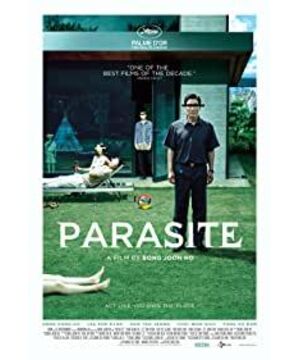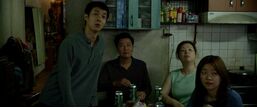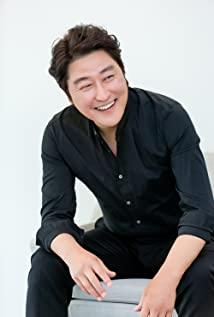South Korean director Bong Joon-ho's new work "Parasite" won the first Palme d'Or in Korean film history at Cannes not long ago.
The most precise comment on the film comes from the director himself: this is a comedy without a clown, a tragedy without a villain. The class segregation caused by extreme wealth disparities is on full display.
class isolates everything
The story told in "Parasite" is so simple that there are only two types of people, the rich and the poor, but it reflects the deep class segregation everywhere.
The poor father played by Song Kanghao lives in a semi-basement with the whole family. Only a window sticks out of the ground, just to catch the wild urine thrown by the drunk.
The wealthy family lives in villas designed by well-known architects, unaware that there is a hungry ghost hiding in the basement of their home. At the end of the film, the poor father also lived in this basement in order to avoid being pursued. Two generations of poor people living in basements were not imprisoned, but by their own free will.
If it is made into a picture, it is like an arrogant and domineering underworld boss who slaps the poor father in the face with the sole of his shoe: "The poor only deserve to live underground, don't you fucking know?" The name of this boss is called society .
When a heavy rain fell from the sky, the rich young master set up his tent excitedly, imagining that he was a little Indian warrior sleeping in the wild at night.
The poor family in the semi-basement was busy cleaning up the remaining debris in the chest-deep stagnant water. The poor girl could only sit on the toilet lid and use her whole body weight to press down the toilet that was spewing feces that could not be blocked.
The rich man and his wife discussed the strange smell of the poor man's father. Prosperity obviously limited their imagination of the taste. After thinking for a long time, the rich man's father could only describe it as "the smell in the subway", the smell of the poor man.
This slap is not only slapped on the face of the poor, but also on the majority of the audience sitting in the movie theater who consider themselves middle-class. Having a job in a suit from 9 to 6 is awesome? In the eyes of the rich, the people who take the subway are the poor, or the poor with taste.
Fortunately, modern society has not yet developed to the extent that death can be isolated. At the end of the film, the poor sister and the rich father each get a knife. The rich father did not exchange money for better medical technology, but died following the laws of nature.
"Parasite" has all the qualities of a good commercial film (except for a cliché happy ending), the rhythm is not dragged, the comedy elements are interspersed in place, and the absurdity and reality transition smoothly. At the same time, the plot of the film is closely matched, the collapse of everyone in the film is reasonable, and the transition from mediocrity to cruelty is also convincing.
When you cross that threshold, you have surpassed reality
There is only one point, the most important class segregation in reality has not been reflected.
In reality, most of the poor will also experience intellectual isolation.
A poor boy from an extremely poor family at the bottom of the society, relying on forging academic certificates to become the tutor of a rich daughter, and then cooperating with his sister, father and mother to play a conspiracy, and finally put the whole family into a rich man's villa, while receiving a salary and eating spicy food.
Such an intelligent and courageous family can make up a tight-knit story and have superb acting skills. If they were ruthless enough, they should have gotten rich by eating illegal products long ago. How could the whole family not find a job? Even if you lack courage, at least you shouldn't fall into the trap of extreme poverty.
In reality, the self-righteous little shrewdness of the poor will be seen through by the rich and well-informed. The poor boy can't get past the rich man's wife, and can't get a job as an English tutor.
But director Feng Junhao said that this is the only way he can think of to make the two families at the extremes of rich and poor meet.
Just like a finger raised by Doctor Strange to Iron Man, it represents the only one of 14 million possibilities that can defeat Thanos. Among the 14 million trends in reality, there are only tutors who can make the poor boy cross the class segregation and walk into the door of the rich man's villa.
No political fables, only harsh reality
In recent years, Korean filmmakers have produced a large number of excellent films with strong political satire. The film starring Song Kanghao himself has several films such as "Taxi Driver", "The Defender", "Memories of Murder" and "Common Security Zone".
But "Parasite" proves that as long as it is a realistic theme mixed with real and absurd, even if it does not talk about politics, Korean directors can also play it with ease.
In addition to the ultimate political fable "1984", Orwell also wrote a novel "Come and Breathe" that expresses absurd reality.
The middle-aged man who has just bid farewell to the unbearable past is ready to enjoy the wonderful new life in his fantasy. However, just as the small flame of new life was lit, it was doused by the pouring rain. Like a drowning unlucky bastard, tearing open the water plants to avoid piranhas, facing the sun on the water and surfacing violently, only to bump into the thick layer of ice.
Human nature reflects politics, and politics understands human nature. The sense of despair in the face of political shady will also transform into the powerlessness of being raped by life. The poor or the common people are the majority of society and the lowest level in the chain of contempt.
Movies cannot provide solutions to these stifling social problems, but they can help us recognize our place.
(First published on Orange News)
View more about Parasite reviews











